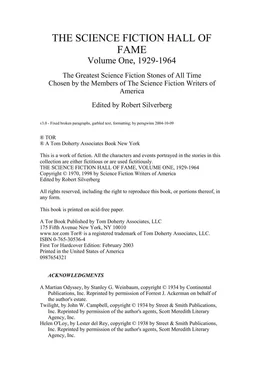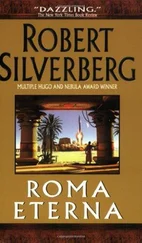"How you know?" asked Leroy.
"They were weathered—edges rounded. Silica doesn't weather easily even on earth, and in this climate—!"
"How old you think?"
"Fifty thousand—a hundred thousand years. How can I tell? The little ones we saw in the morning were older—perhaps ten times as old. Crumbling. How old would that make them? Half a million years? Who knows?" Jarvis paused a moment.
"Well," he resumed, "we followed the line. Tweel pointed at them and said 'rock' once or twice, but he'd done that many times before. Besides, he was more or less right about these.
"I tried questioning him. I pointed at a pyramid and asked 'People?' and indicated the two of us. He set up a negative sort of clucking and said, 'No, no, no. No one-onetwo. No two-two-four,' meanwhile rubbing his stomach. I just stared at him and he went through the business again. 'No one-one-two. No two-two-four.' I just gaped at him."
"That proves it!" exclaimed Harrison. "Nuts!"
"You think so?" queried Jarvis sardonically. "Well, I figured it out different! 'No one-one-two!' You don't get it, of course, do you?"
"Nope—nor do you!"
"I think I do! Tweel was using the few English words he knew to put over a very complex idea. What, let me ask, does mathematics make you think of?"
"Why—of astronomy. Or—or logic!"
"That's it! 'No one-one-two!' Tweel was telling me that the builders of the pyramids weren't people—or that they weren't intelligent, that they weren't reasoning creatures! Get it?"
"Huh! I'll be damned!"
"You probably will."
"Why," put in Leroy, "he rub his belly?"
"Why? Because, my dear biologist, that's where his brains are! Not in his tiny head—in his middle!"
"C'est impossible!"
"Not on Mars, it isn't! This flora and fauna aren't earthly; your bio- pods prove that!" Jarvis grinned and took up his narrative. "Anyway, we plugged along across Xanthus and in about the middle of the afternoon, something else queer happened.
The pyramids ended."
"Ended!"
"Yeah; the queer part was that the last one—and now they were ten- footers—was capped! See? Whatever built it was still inside; we'd trailed 'em from their half-million-year-old origin to the present.
"Tweel and I noticed it about the same time. I yanked out my automatic (I had a clip of Boland explosive bullets in it) and Tweel, quick as a sleight-of-hand trick, snapped a queer little glass revolver out of his bag. It was much like our weapons, except that the grip was larger to accommodate his four-taloned hand. And we held our weapons ready while we sneaked up along the lines of empty pyramids.
"Tweel saw the movement first. The top tiers of bricks were heaving, shaking, and suddenly slid down the sides with a thin crash. And then— something—something was coming out!
"A long, silvery-grey arm appeared, dragging after it an armored body. Armored, I mean, with scales, silver-grey and dull-shining. The arm heaved the body out of the hole; the beast crashed to the sand.
"It was a nondescript creature—body like a big grey cask, arm and a sort of mouth-hole at one end; stiff, pointed tail at the other—and that's all. No other limbs, no eyes, ears, nose—nothing! The thing dragged itself a few yards, inserted its pointed tail in the sand, pushed itself upright, and just sat,
"Tweel and I watched it for ten minutes before it moved. Then, with a creaking and rustling like—oh, like crumpling stiff paper—its arm moved to the mouth-hole and out came a brick! The arm placed the brick carefully on the ground, and the thing was still again.
"Another ten minutes—another brick. Just one of Nature's bricklayers. I was about to slip away and move on when Tweel pointed at the thing and said 'rock'! I went 'huh?' and he said it again. Then, to the accompaniment of some of his trilling, he said, 'No—no—,' and gave two or three whistling breaths.
"Well, I got his meaning, for a wonder! I said, 'No breath?' and demonstrated the word. Tweel was ecstatic; he said, 'Yes, yes, yes! No, no, no breet!' Then he gave a leap and sailed out to land on his nose about one pace from the monster!
"I was startled, you can imagine! The arm was going up for a brick, and I expected to see Tweel caught and mangled, but—nothing happened! Tweel pounded on the creature, and the arm took the brick and placed it neatly beside the first. Tweel rapped on its body again, and said 'rock,' and I got up nerve enough to take a look myself.
"Tweel was right again. The creature was rock, and it didn't breathe!"
"How you know?" snapped Leroy, his black eyes blazing interest.
"Because I'm a chemist. The beast was made of silica! There must have been pure silicon in the sand, and it lived on that. Get it? We, and Tweel, and those plants out there, and even the biopods are carbon life; this thing lived by a different set of chemical reactions. It was silicon life!"
"La vie silicieuseV shouted Leroy. "I have suspect, and now it is proof! I must go see! llfaut que je—"
"All right! All right!" said Jarvis. "You can go see. Anyhow, there the thing was, alive and yet not alive, moving every ten minutes, and then only to remove a brick.
Those bricks were its waste matter. See, Prenchy? We're carbon, and our waste is carbon dioxide, and this thing is silicon, and its waste is silicon dioxide—silica. But silica is a solid, hence the bricks. And it builds itself in, and when it is covered, it moves over to a fresh place to start over. No wonder it creaked! A living creature half a million years old!"
"How you know how old?" Leroy was frantic.
"We trailed its pyramids from the beginning, didn't we? If this weren't the original pyramid builder, the series would have ended somewhere before we found him, wouldn't it?—ended and started over with the small ones. That's simple enough, isn't it?
"But he reproduces, or tries to. Before the third brick came out, there was a little rustle and out popped a whole stream of those little crystal balls. They're his spores, or eggs, or seeds—call 'em what you want. They went bouncing by across Xanthus just as they'd bounced by us back in the Mare Chronium. I've a hunch how they work, too—this is for your information, Leroy. I think the crystal shell of silica is no more than a protective covering, like an eggshell, and that the active principle is the smell inside. It's some sort of gas that attacks silicon, and if the shell is broken near a supply of that element, some reaction starts that ultimately develops into a beast like that one."
"You should try!" exclaimed the little Frenchman. "We must break one to see!"
"Yeah? Well, I did. I smashed a couple against the sand. Would you like to come back in about ten thousand years to see if I planted some pyramid monsters? You'd most likely be able to tell by that time!" Jarvis paused and drew a deep breath. "Lord!
That queer creature! Do you picture it? Blind, deaf, nerveless, brainless—just a mechanism, and yet—immortal! Bound to go on making bricks, building pyramids, as long as silicon and oxygen exist, and even afterwards it'll just stop. It won't be dead.
If the accidents of a million years bring it its food again, there it'll be, ready to run again, while brains and civilizations are part of the past. A queer beast—yet I met a stranger one!"
"If you did, it must have been in your dreams!" growled Harrison.
"You're right!" said Jarvis soberly. "In a way, you're right. The dreambeast! That's the best name for it—and it's the most fiendish, terrifying creation one could imagine!
More dangerous than a lion, more insidious than a snake!"
"Tell me!" begged Leroy. "I must go see!"
"Not this devil!" He paused again. "Well," he resumed, "Tweel and I left the pyramid creature and plowed along through Xanthus. I was tired and a little disheartened by Putz's failure to pick me up, and Tweel's trilling got on my nerves, as did his flying nosedives. So I just strode along without a word, hour after hour across that monotonous desert.
Читать дальше












